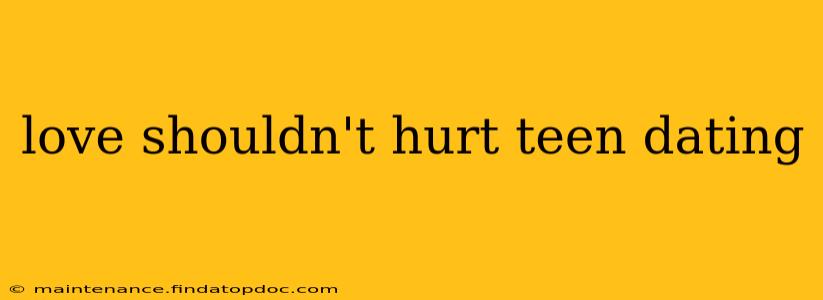Navigating the world of dating as a teenager can be exciting, confusing, and sometimes, downright scary. While the thrill of a first crush or blossoming romance is undeniably exhilarating, it's crucial to understand that healthy relationships are built on respect, trust, and mutual happiness. The idea that "love should hurt" is a dangerous myth that can have devastating consequences. This guide will help teens understand the signs of unhealthy relationships and navigate dating safely and confidently.
What is a Healthy Relationship?
A healthy relationship is characterized by mutual respect, open communication, and a shared sense of equality. Both partners feel comfortable expressing their feelings, needs, and boundaries without fear of judgment or retribution. There's a balance of power, and decisions are made collaboratively. Disagreements are handled constructively, with a focus on understanding each other's perspectives rather than resorting to manipulation or control. Crucially, both individuals feel safe, supported, and empowered within the relationship.
What are the Signs of an Unhealthy Relationship?
Unfortunately, many teens fall into unhealthy relationships without realizing it. Recognizing the warning signs is vital for protecting your well-being. These signs can manifest in various ways, including:
- Controlling Behavior: This can range from controlling who you see, what you wear, or where you go, to monitoring your phone and social media activity. A partner who attempts to isolate you from friends and family is a major red flag.
- Verbal Abuse: This includes insults, name-calling, constant criticism, and threats. Even seemingly "joking" insults can be emotionally damaging over time.
- Physical Abuse: Any form of physical violence, from pushing and shoving to hitting and slapping, is completely unacceptable. No one deserves to be physically harmed by someone they're dating.
- Emotional Manipulation: This involves using guilt, intimidation, or other tactics to control your emotions and actions. A partner might try to make you feel responsible for their feelings or actions.
- Jealousy and Possessiveness: While a little jealousy might be understandable, excessive possessiveness and controlling behavior are serious issues. A healthy relationship involves trust and mutual respect for each other's independence.
- Pressure for Sex: Consent must always be freely given, enthusiastic, and ongoing. Any pressure or coercion to engage in sexual activity is a violation of boundaries and is never okay.
How Can I Protect Myself?
Protecting yourself in the dating world requires awareness, assertiveness, and a support system. Here are some key steps you can take:
- Set Boundaries: Establish clear boundaries early on and communicate them firmly. This includes setting limits on physical affection, sharing personal information, and how much time you spend together.
- Trust Your Instincts: If something feels off or wrong, don't ignore it. Your gut feeling is often a reliable indicator of potential danger.
- Talk to Someone You Trust: Having a trusted adult or friend to confide in can provide valuable support and guidance. This could be a parent, teacher, counselor, or another trusted individual.
- Learn to Say No: It's okay to say no to anything that makes you uncomfortable, whether it's a date, a request, or an activity.
- Know Your Rights: You have the right to feel safe, respected, and valued in any relationship. If you're experiencing abuse, you're not alone, and there are resources available to help.
What if I'm Already in an Unhealthy Relationship?
Leaving an unhealthy relationship can be difficult, but it's essential for your well-being. Reach out to a trusted adult for support and guidance. There are many resources available to help you develop a safety plan and escape an abusive situation. Remember, you deserve to be in a healthy, happy relationship.
How Do I Build a Healthy Relationship?
Building healthy relationships starts with self-respect and understanding your own needs and boundaries. Look for partners who treat you with respect, value your opinions, and support your goals. Open communication, mutual trust, and shared respect are the cornerstones of any healthy relationship.
Where Can I Get Help?
Numerous resources are available for teens experiencing relationship difficulties or abuse. These resources can provide confidential support, guidance, and safety planning. You can usually find contact information for local support organizations online, through your school counselor, or via your family doctor. Remember, you are not alone.
This article provides general information and does not constitute professional advice. If you are in an abusive situation, please seek help immediately. Your safety and well-being are paramount.
